-
You Wouldn't Want To Live Without Libraries!
Fiona Macdonald
Paperback (Book House, April 28, 2019)For 5,000 years and more, libraries have been gathering and preserving writings of all kinds. They re keepers of the world's memory. They re storehouses of knowledge, and imagination, and fun. Learn about how these places and their collections of written words allow us to check our facts, find important information, share stories, beliefs and ideas, build communities and learn valuable life skills. Specially commissioned cartoon-style illustrations in full colour make these books attractive and accessible even to reluctant readers. Information is conveyed through captions, labels and humorous speech bubbles in addition to the main text. Illustrated sidebars headed 'How It Works', 'Top Tip' or 'You Can Do It' supply more facts, describe simple, safe experiments, or steps that readers can take to help make the world a better place. Each volume includes a timeline and a list of 'Did You Know?' facts. Sample fact: Perhaps 80% of ancient writings have been lost. The 20% that have survived were preserved in libraries such as Alexandria, where scribes made copies of important texts.
-
You Wouldn't Want to Live Without Cell Phones!
Jim Pipe, Rory Walker
Library Binding (Franklin Watts, Sept. 1, 2014)What would life be like without your cell phone? These?mini-computers have transformed how we live, work, and play: from mobile banking to navigation, downloading music, and talking to our friends. So just how did we get by without them? This title in the fantastic new You Wouldnt Want to Live Without series explores the fascinating ways in which people coped in a phoneless world, and the inventions and discoveries they made throughout the years. With its informative timeline, helpful "You Can Do It" tips, and hilarious cartoon-style illustrations, this book will soon show you why you really wouldnt want to live without cell phones! The well-organized text in this title allows readers to explore relationships between historic scientific events. Grade-appropriate contexts help readers determine the meaning of academic words and phrases while the vivid illustrations and text features help navigate the text and locate answers to questions.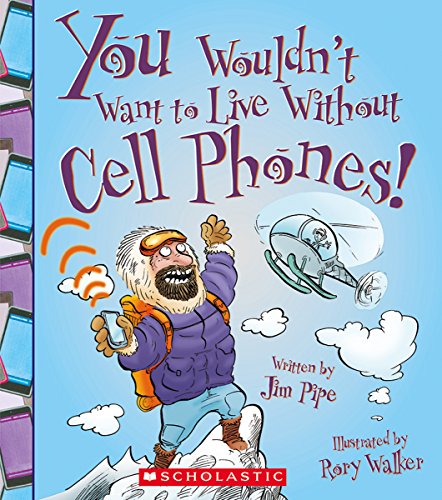 T
T
-
You Wouldn't Want To Live Without Soap!
Alex Woolf, Mark Bergin
Library Binding (Turtleback Books, Sept. 1, 2015)FOR USE IN SCHOOLS AND LIBRARIES ONLY. Would you rather put your grubby clothes in the washing machine, or take them down to the river and beat the dirt out of them? You re lucky to have the choice! Soaps and detergents are among the great benefits of modern life. They help to keep us comfort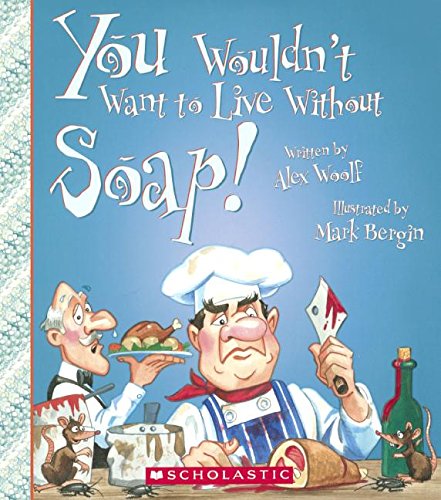 W
W
-
You Wouldn't Want To Live Without Dentists!
Fiona MacDonald, David Antram
Library Binding (Turtleback Books, Feb. 1, 2015)FOR USE IN SCHOOLS AND LIBRARIES ONLY. Combines humorous cartoons and facts to describe what it would be like to live without dentists, how important teeth are to health and daily life, and how people dealt with tooth decay in the past. S
S
-
You Wouldn't Want to Live Without Nurses!
Fiona MacDonald
Library Binding (Turtleback Books, Sept. 1, 2016)FOR USE IN SCHOOLS AND LIBRARIES ONLY.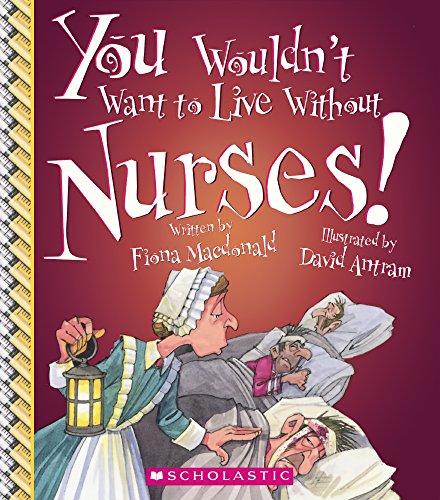 R
R
-
You Wouldn't Want to Live Without Simple Machines!
Anne Rooney, Mark Bergin
Library Binding (Franklin Watts, Sept. 1, 2018)Learn about how simple machines enable practically everything around us to work.This series takes readers (Ages 8-12) on a historical journey, examining how people coped in the past and how they developed ingenious ways to make life safer and less unpleasant. Each book features full-color cartoon-style illustrations and hilarious speech bubbles to heighten interest, making the series attractive even to reluctant readers.Simple machines are around us all the time and we use them every day. You might not even think of them as machines. Many are built into complex (compound) machines-but the simple machine is still in there, doing its job. Learn about how simple machines enable practically everything around us to work, allowing us to travel in wheeled vehicles, lift very heavy objects, fix things together, and break things apart.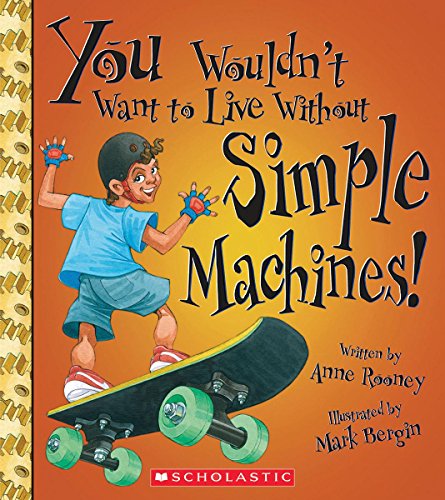 T
T
-
You Wouldn't Want To Live Without Clocks And Calendars!
Fiona Macdonald, David Antram
Library Binding (Turtleback Books, Sept. 1, 2015)FOR USE IN SCHOOLS AND LIBRARIES ONLY. That hour that drags, that day you can't wait for and those months of blissful sun that you count down to! All these things have been made measurable by clocks and calendars. Although time may not always be on our side, without clocks and calendars we wo S
S
-
You Wouldn't Want to Live Without Clean Water!
Roger Canavan, David Salariya, David Antram
Library Binding (Franklin Watts, Sept. 1, 2014)How would you cope in a world without water? Clean water is far, far more important than you might think! This title in the fantastic new You Wouldnt Want to Live Without series is bursting with surprising facts about this essential life source. As you learn about everything from how water keeps us healthy to the astounding ways in which it is used across the word, youll soon see why you really, really wouldnt want to live without it! Featuring comprehensive diagrams, a timteline, hilarious cartoon-style illustrations, and "You Can Do It!" panels on how to conduct your own water experiments. The well-organized text in this title allows readers to explore relationships between historic scientific events. Grade-appropriate contexts help readers determine the meaning of academic words and phrases while the vivid illustrations and text features help navigate the text and locate answers to questions. T
T
-
You Wouldn't Want to Live Without Bacteria!
Roger Canavan
Paperback (Book House, Feb. 12, 2015)Though most of them are too small to be seen with the naked eye, bacteria are everywhere. They appeared on Earth more than 3 billion years before the first dinosaurs. Some bacteria cause deadly diseases, but many of them are helpful to us. They fertilise the soil by breaking down dead material, and they are an essential ingredient in many foods. Bacteria in our own bodies are a vital part of the digestive process.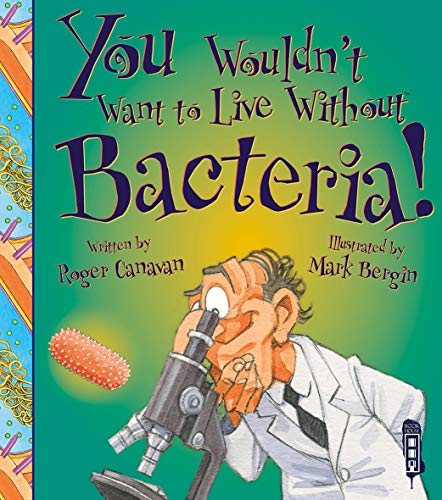 T
T
-
You Wouldn't Want to Live Without Vegetables!
Alex Woolf, David Antram
Library Binding (Franklin Watts, Jan. 15, 2016)Vegetables provide us with essential vitamins and minerals that make our bodies healthier and stop us from getting sick.This series takes readers (Ages 8-12) on a historical journey, examining how people coped in the past and how they developed ingenious ways to make life safer and less unpleasant. Each book features full-color cartoon-style illustrations and hilarious speech bubbles to heighten interest, making the series attractive even to reluctant readers.When someone mentions spinach, broccoli or kale, do you think YUCK? Why do we need these foods and what would the world be like without them? Much better, right? Wrong! Vegetables are also used to make things like dyes, lotions and adhesives. Learn how vegetables are grown and cultivated, and the often inspired innovations made with such humble foodstuffs as the potato and the carrot. R
R
-
You Wouldn't Want to Live Without Antibiotics!
Anne Rooney
Paperback (Book House, Jan. 15, 2015)Many dangerous diseases are carried by bacteria - tiny organisms that can get into the body and multiply inside it. Antibiotics are medicines that kill bacteria. They can be used to cure many diseases that were deadly in the past. This book tells the story of how antibiotics were discovered, and how they have transformed the treatment of disease. T
T
-
You Wouldn't Want to Live Without Books!
Professor Alex Woolf
Paperback (Book House, Jan. 15, 2015)Imagine a world without books. You would have no information about the world outside, except what you could learn from travellers. You would know nothing about the past, except what storytellers could remember. The book is a truly amazing data storage device, yet most of us take it for granted. Find out how it has developed over the centuries, and how it is being reinvented for the future. T
T